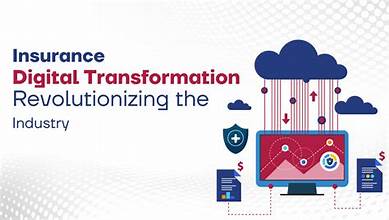In the fast-evolving landscape of the publishing industry, digital insurance is playing a pivotal role in reshaping how publishers navigate risks and secure their digital assets. Let's delve into the realm of how digital insurance is transforming the publishing industry, revolutionizing traditional practices and ushering in a new era of protection and efficiency.
Overview of Digital Insurance in Publishing

Digital insurance in the publishing industry refers to the use of technology and online platforms to protect publishers from risks related to digital assets, cyber threats, data breaches, and intellectual property issues.
It is crucial for publishers to have digital insurance to safeguard their content, customer data, and online presence in an increasingly digital landscape.
Importance of Digital Insurance for Publishers
- Protection against cyber threats: Digital insurance helps publishers mitigate the risks of cyber attacks, data breaches, and other online security issues that could compromise sensitive information.
- Intellectual property coverage: Publishers can secure their copyrights, trademarks, and other intellectual property rights through digital insurance, ensuring legal protection against infringement.
- Recovery from digital asset losses: In case of data loss or corruption, digital insurance can provide financial assistance for recovery efforts, minimizing the impact on publishing operations.
Examples of Digital Insurance Tools in Publishing
- Media Liability Insurance:Covers publishers against defamation, libel, and copyright infringement claims arising from their content.
- Cyber Insurance:Protects publishers from losses due to cyber attacks, ransomware, and data breaches, offering financial support for recovery and legal expenses.
- Intellectual Property Insurance:Safeguards publishers' intellectual property rights, including trademarks, patents, and copyrights, providing coverage for legal disputes and enforcement.
Benefits of Digital Insurance for Publishers

Digital insurance offers numerous benefits to publishers, helping them mitigate risks, enhance data security, and achieve cost savings through innovative solutions.
Mitigating Risks
- Digital insurance provides publishers with coverage against various risks such as cyber attacks, data breaches, and intellectual property theft.
- By having appropriate digital insurance policies in place, publishers can safeguard their assets and reputation in the event of unforeseen circumstances.
- Insurance coverage can also help publishers recover quickly from incidents that could disrupt their operations, ensuring business continuity.
Enhancing Data Security
- Digital insurance encourages publishers to implement robust cybersecurity measures to protect sensitive information and prevent data breaches.
- Insurers often offer resources and guidance to help publishers strengthen their data security practices, reducing the likelihood of cyber threats.
- In the digital age, where data is a valuable asset, having digital insurance can give publishers peace of mind knowing that their information is well-protected.
Cost Savings
- Through digital insurance, publishers can optimize their risk management strategies and avoid costly financial losses associated with cyber incidents or legal disputes.
- Insurance policies tailored to the publishing industry can provide coverage for specific risks that publishers face, offering a cost-effective way to manage potential liabilities.
- By proactively investing in digital insurance, publishers can save money in the long run by mitigating risks and minimizing the financial impact of unexpected events.
Impact of Digital Insurance on Content Distribution
With the rise of digital insurance in the publishing industry, the landscape of content distribution has undergone significant changes. Let's explore how digital insurance has influenced the distribution of digital content and protected intellectual property rights.
Protecting Intellectual Property Rights
Digital insurance plays a crucial role in safeguarding intellectual property rights for publishers. By providing coverage for copyright infringement, piracy, and other forms of content misuse, digital insurance ensures that publishers can protect their creative works and maintain control over their content.
Transforming Content Distribution Strategies
- One way digital insurance has transformed content distribution strategies is by providing publishers with the confidence to explore new distribution channels. With the assurance that their content is protected, publishers can take advantage of digital platforms and reach a wider audience
.
- Additionally, digital insurance has enabled publishers to adapt to the changing digital landscape by offering tailored coverage for online content distribution. This flexibility allows publishers to stay ahead of emerging risks and protect their content in a rapidly evolving environment.
- Moreover, digital insurance has incentivized publishers to invest in digital content distribution by mitigating the financial risks associated with online publishing. This has led to increased innovation in content delivery methods and enhanced user experiences for readers.
Case Studies of Digital Insurance Implementation
Implementing digital insurance solutions in the publishing industry has led to significant improvements and outcomes for several companies. Let's explore some case studies that highlight the successful integration of digital insurance.
Case Study 1: Company A
- Company A, a leading publishing house, implemented digital insurance to streamline their claims processing and enhance data security.
- After the implementation, Company A reported a 30% reduction in claim processing time and a 20% decrease in fraudulent claims.
- Their overall operational efficiency improved, leading to better customer satisfaction and cost savings.
Case Study 2: Company B
- Company B, a digital magazine publisher, adopted digital insurance to protect their content and mitigate cyber risks.
- Following the implementation, Company B experienced a 40% decrease in cyber incidents and a 25% increase in content security.
- They were able to safeguard their intellectual property and maintain a competitive edge in the market.
Challenges Faced and Overcoming Obstacles
- Many publishers initially faced resistance from employees accustomed to traditional insurance processes.
- Training and education programs were crucial in helping staff adapt to the new digital insurance systems.
- Collaboration with technology partners and continuous feedback loops played a key role in overcoming challenges during the transition phase.
Future Trends and Innovations in Digital Insurance for Publishers
Digital insurance in the publishing industry is expected to continue evolving to meet the changing needs of publishers in the digital age. Emerging technologies are shaping the future of digital insurance for publishers, offering new opportunities for innovation and growth.
AI and Machine Learning Integration
The integration of artificial intelligence (AI) and machine learning technologies is expected to revolutionize digital insurance for publishers. These technologies can analyze vast amounts of data to assess risks, personalize policies, and streamline claims processing, leading to more efficient and cost-effective insurance solutions.
Blockchain for Transparency and Security
Blockchain technology is poised to enhance transparency and security in digital insurance for publishers. By providing a tamper-proof and decentralized ledger, blockchain can improve data integrity, reduce fraud, and enable faster and more secure transactions between publishers and insurers.
Personalized Policies and Dynamic Pricing
With advancements in data analytics and customer profiling, digital insurance for publishers is moving towards personalized policies and dynamic pricing models. Publishers can benefit from tailored insurance coverage based on their specific needs and behaviors, leading to more accurate risk assessment and potentially lower premiums.
Cyber Insurance for Digital Risks
As digital threats continue to evolve, cyber insurance is becoming essential for publishers to protect against data breaches, cyberattacks, and other online risks. Digital insurance providers are developing specialized cyber insurance products to help publishers mitigate the growing cybersecurity challenges they face.
Wrap-Up

As we conclude our exploration of how digital insurance is revolutionizing the publishing industry, it becomes evident that this transformative trend is not just a passing phase but a fundamental shift towards safeguarding intellectual property, enhancing data security, and optimizing operational costs for publishers worldwide.
With the continued evolution of digital insurance, publishers are poised to thrive in an increasingly digitized world, embracing innovation and resilience in the face of emerging challenges.
 Digital insurance in the publishing industry refers to the use of technology and online platforms to protect publishers from risks related to digital assets, cyber threats, data breaches, and intellectual property issues.
It is crucial for publishers to have digital insurance to safeguard their content, customer data, and online presence in an increasingly digital landscape.
Digital insurance in the publishing industry refers to the use of technology and online platforms to protect publishers from risks related to digital assets, cyber threats, data breaches, and intellectual property issues.
It is crucial for publishers to have digital insurance to safeguard their content, customer data, and online presence in an increasingly digital landscape.
 Digital insurance offers numerous benefits to publishers, helping them mitigate risks, enhance data security, and achieve cost savings through innovative solutions.
Digital insurance offers numerous benefits to publishers, helping them mitigate risks, enhance data security, and achieve cost savings through innovative solutions.
 As we conclude our exploration of how digital insurance is revolutionizing the publishing industry, it becomes evident that this transformative trend is not just a passing phase but a fundamental shift towards safeguarding intellectual property, enhancing data security, and optimizing operational costs for publishers worldwide.
With the continued evolution of digital insurance, publishers are poised to thrive in an increasingly digitized world, embracing innovation and resilience in the face of emerging challenges.
As we conclude our exploration of how digital insurance is revolutionizing the publishing industry, it becomes evident that this transformative trend is not just a passing phase but a fundamental shift towards safeguarding intellectual property, enhancing data security, and optimizing operational costs for publishers worldwide.
With the continued evolution of digital insurance, publishers are poised to thrive in an increasingly digitized world, embracing innovation and resilience in the face of emerging challenges.




